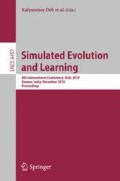Abstract
In this paper, we develop a tree adjoining grammar (TAG) to capture semantics of a story with long-distance causal dependency, and present a computational framework for story plot generation. Under this framework, TAG is derived and a story plot is represented by a derivation tree of TAG. The generated plots are then evolved using grammar guided genetic programming (GGGP) to generate creative, interesting and complex story plots. To evaluate these newly generated plots, a human-in-the-loop approach is used. An experimental study was carried out, in which this framework was used to produce creative, interesting and complex plots from a predesigned fabula based on a story known as “The magpie and the water bottle”. The experimental study demonstrated that TAG and GGGP can potentially contribute significantly to complex automatic story plot generation.
Access this chapter
Tax calculation will be finalised at checkout
Purchases are for personal use only
Preview
Unable to display preview. Download preview PDF.
References
Hsueh-Min, C., Von-Wun, S.: Planning-Based Narrative Generation in Simulated Game Universes. IEEE Transactions on Comp. Intel. & AI in Games 1(3), 200–213 (2009)
McKeever, W., et al.: Scenario management and automated scenario generation. In: Modeling and Simulation for Military Applications, pp. 62281A.1–62281A.12. SPIE, Florida (2006)
Sebastiani, F.: Machine Learning in Automated Text Categorization. ACM Computing Surveys 34(1), 1–47 (2002)
Fairclough, C., Cunningham, P.: An interactive story engine. In: O’Neill, M., Sutcliffe, R.F.E., Ryan, C., Eaton, M., Griffith, N.J.L. (eds.) AICS 2002. LNCS (LNAI), vol. 2464, pp. 171–176. Springer, Heidelberg (2002)
Shim, Y., Kim, M.: Automatic short story generator based on autonomous agents. In: Kuwabara, K., Lee, J. (eds.) PRIMA 2002. LNCS (LNAI), vol. 2413, pp. 151–162. Springer, Heidelberg (2002)
Riedl, M., Young, R.: Open-world planning for story generation. In: 9th International Joint Conference on Artificial Intelligence, pp. 1719–1720. Professional Book Center, Edinburgh (2005)
Gervás, P., et al.: Story plot generation based on CBR. KBS 18(4-5), 235–242 (2005)
Swartjes, I., Theune, M.: The virtual storyteller: Story generation by simulation. In: 20th Belgian-Netherlands Conference on Artificial Intelligence, Enschede, pp. 257–265 (2008)
Lee, M.G.: A model of story generation. University of Manchester, Manchester (1994)
Bui, V., Abbass, H., Bender, A.: Evolving Stories: Grammar Evolution for Automatic Plot Generation. In: IEEE World Congress on Computational Intellegence, Barcelona (2010)
Bal, M.: Narratology: Introduction to the theory of narrative. University of Toronto Press, Toronto (1997)
Rimmon-Kenan, S.: Narrative fiction: Contemporary poetics. Routledge, London (2002)
Díaz-Agudo, B., Gervás, P., Peinado, F.: A case based reasoning approach to story plot generation. In: Funk, P., González Calero, P.A. (eds.) ECCBR 2004. LNCS (LNAI), vol. 3155, pp. 142–156. Springer, Heidelberg (2004)
Turner, S.: MINSTREL: a computer model of creativity and storytelling. University of California, Los Angeles (1993)
Pérez y Pérez, R., Sharples, M.: MEXICA: A computer model of a cognitive account of creative writing. Journal of Experimental and Theoretical Artificial Intelligence 13(2), 119–139 (2001)
Bringsjord, S., Ferrucci, D.: Artificial Intelligence and Literary Creativity: Inside the Mind of Brutus a Storytelling Machine. Routledge, London (2000)
Peinado, F.: Interactive digital storytelling: Automatic direction of virtual environments. Upgrade. Monograph:Virtual Environments 7(2), 42–46 (2006)
Mateas, M., Stern, A.: Writing Façade: A Case Study in Procedural Authorship. In: Second Person: Role-Playing and Story in Games and Playable Media, 183–208 (2004)
Cheong, Y., Young, R.: A computational model of narrative generation for suspense. In: 21st National Conference on Artificial intelligence, vol. 2, pp. 1906–1907. AAAI Press, Boston (2006)
Theune, M., et al.: The virtual storyteller: Story creation by intelligent agents. In: Technologies for Interactive Digital Storytelling and Entertainment Conference, pp. 204–215. Citeseer, Darmstadt (2003)
Riedl, M., Young, R.: From linear story generation to branching story graphs. IEEE Computer Graphics and Applications 26(3), 23–31 (2006)
Joshi, A., Schabes, Y.: Tree-adjoining grammars. Handbook of Formal Languages, Beyond Words, pp. 69–123. Springer, Heidelberg (1997)
Hoai, N.X.: A Flexible Representation for Genetic Programming from Natural Language Processing. University of New South Wales, Canberra (2004)
Trabasso, T., Broek, P., Suh, S.: Logical necessity and transitivity of causal relations in stories. Discourse Processes 12(1), 1–25 (1989)
Swartjes, I., Theune, M.: A Fabula model for emergent narrative. Technologies for Interactive Digital Storytelling and Entertainment, 49–60 (2006)
Theune, M., et al.: The virtual storyteller. ACM SigGroup Bulletin 23(2), 20–21 (2002)
Joshi, A., Levy, L., Takahashi, M.: Tree adjunct grammars. Journal of Computer and System Sciences 10(1), 136–163 (1975)
Schabes, Y.: Mathematical and computational aspects of lexicalized grammars. University of Pennsylvania, Philadelphia (1990)
Weir, D.J.: Characterizing mildly context-sensitive grammar formalisms. University of Pennsylvania, Philadelphia (1988)
Schabes, Y., Waters, R.C.: Lexicalized Context-Free Grammars. In: 31st Annual Meeting of the ACL, pp. 121–129. ACL, Columbus (1993)
Chiang, D.: The weak generative capacity of linear tree-adjoining grammars. In: 8th International Workshop on TAG & Related Formalisms, pp. 25–32. ACL, Sydney (2006)
Rogers, J.: Capturing CFLS with Tree Adjoining Grammars. In: 32nd Annual Meeting of the ACL, pp. 155–162. ACL, Columbus (1994)
Author information
Authors and Affiliations
Editor information
Editors and Affiliations
Rights and permissions
Copyright information
© 2010 Springer-Verlag Berlin Heidelberg
About this paper
Cite this paper
Wang, K., Bui, V.Q., Abbass, H.A. (2010). Evolving Stories: Tree Adjoining Grammar Guided Genetic Programming for Complex Plot Generation. In: Deb, K., et al. Simulated Evolution and Learning. SEAL 2010. Lecture Notes in Computer Science, vol 6457. Springer, Berlin, Heidelberg. https://doi.org/10.1007/978-3-642-17298-4_14
Download citation
DOI: https://doi.org/10.1007/978-3-642-17298-4_14
Publisher Name: Springer, Berlin, Heidelberg
Print ISBN: 978-3-642-17297-7
Online ISBN: 978-3-642-17298-4
eBook Packages: Computer ScienceComputer Science (R0)

